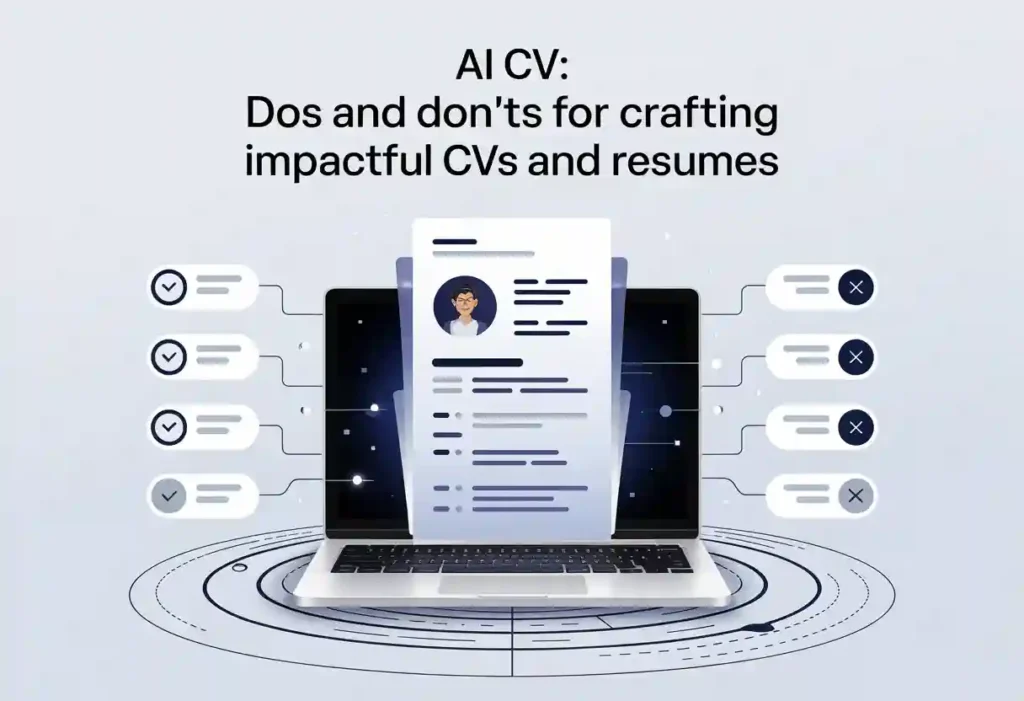Decoding Personality Questions: Your Key to Successful Interviews
Do you know how to answer personality-based questions in an interview?
When you go to a job interview, you probably expect questions about your qualifications, skills, experience, and career goals.
You’ve probably prepared answers for these types of interview questions.
But you might not be ready for personality questions in an interview.
Employers want a well-rounded picture of the person they might be about to hire.
That’s why they need to ask personality interview questions.
In this post, we’ve provided eight common personality-based interview questions that might arise and examples of how to answer them.
We’ve also included top tips and advice from CVJury’s industry experts to help you succeed in your following interview.
Like this post?
Sign up for our blog updates and never miss a post.
We’ll send you A FREE job interview eBook as a thank-you.
Interview questions about your personality help the interviewer understand who you are and whether you’ll fit the company well.
So, you must know how to answer personality-based questions in an interview.
But what are personality-based interview questions?
Typical personality-type interview questions ask about you:
- Personality (will you fit in?)
- Aspirations (why do you want the job?)
- Behaviors (can you cope with the job’s demands?)
- Competency (do you have the relevant skills?)
- Legal (would you bend the rules?)
- Management (how do you work with other people?)
- Self-motivation (are you energized and focused?)
If you’re ready to learn how to answer personality-based questions in an interview, keep reading.
8 Personality-based Interview Questions and Answers
In another post, we’ve already talked about four of the most important interview questions to answer well interview questions to respond well.
Today, we will examine eight more common interview questions that will offer the interviewer insights into your personality.
We’ll also include advice and examples on answering personality-based questions and impressing your potential employer.
Further Reading
- Best Answers to Four Personality-based Interview Questions
- Uncommon job search tips
- Our article on using a resume builder
- How to find a job
- Follow us for more tips
Q1. How Would You Describe Your Personality?
With such an open question, it’s easy to get caught out. So, we’ll tackle it first.
If your interviewer asks you this, it will help to discuss your work ethic and commitment.
Your answer should convince your interviewer that you are serious about completing your work to high standards.
At the same time, aim to give your interviewer an insight into your real personality.
Are you a fun person to be around? Do you motivate and support your colleagues?
Are you more introverted or extroverted?
Suggested Answer
I have a driven personality. I’m enthusiastic about tackling challenges and like to see a job completed correctly.
At the same time, I try to avoid being too serious.
I like to spend time with people and have fun outside of work.
Q2. What Makes You Different from Other Applicants?
The two critical things to remember here are:
- Promote your skills
- Be enthusiastic about the role
Take some time to think about why you are different from other applicants.
What can you bring to the table, and how can you communicate this with the interviewer?
You can focus on soft skills as well as hard skills.
Suggested Answer
My combination of technical skills, social skills, and personal drive sets me apart.
I give my full attention to every part of my work, big or small, but I can also work well with others.
In addition, I recognize that teamwork and focus are as essential as technical skills, and combining all three leads to better overall results.
These qualities make me the best person for the job.
Q3. Are You a Team Player?
With this personality interview question, the interviewer tries to gauge whether you can work as a team.
Describe what makes you a team player and whether you enjoy working with a team.
Suggested Answer
I work extremely hard when I’m part of a team because I know others depend on me.
Furthermore, working with a strong team is always more enjoyable because collaboration leads to breakthroughs.
The most important thing to remember about teamwork is that a team is only as strong as its weakest member.
I always aim to help teammates who might be struggling, and seek help from teammates when needed.
Q4. What Is Your Ideal Team?
This interview question shows you recognize the key features of a strong team.
It’s also your chance to highlight any personal preferences regarding the kind of team you prefer to work with.
Suggested Answer
Of course, my ideal team would have a strong work ethic.
At the same time, team members should have a social connection so that working together is both productive and enjoyable.
A strong team communicates well, works together, and respects each other’s ideas while working towards a common goal.
Q5. What Was the Result of Your Last Appraisal?
This interview question allows you to reflect on your strengths and weaknesses in previous job positions.
Of course, you need to include the positives of your previous appraisals.
However, it’s also essential to include any negative feedback you receive.
You can then discuss how you improved by considering your employer’s comments.
Suggested Answer
Generally, very good! My manager drew a few things to my attention.
I found these helpful in terms of giving me a way to improve my work.
Top-Tip
Include specific feedback from your last appraisal, if possible.
For recent graduates, this can be feedback from your university tutor.
Choose one negative feedback to use as an example of your ability to take criticism and improve.
Q6. What Skills Should Your Boss Have?
If you’re asked this personality interview question, you want to draw upon positive experiences from your previous bosses.
In addition, it’s an opportunity to demonstrate your understanding of the skills a good boss should have.
Suggested Answer
A good boss should be determined and focused.
They should be able to make tough decisions without too much hesitation.
But if I were to join this firm, I would appreciate a leadership team that values team members’ input and expertise.
Ideally, a manager should work collectively with their team to achieve the set goals.
Q7. Why Did You Move to The City?
Naturally, employers want to know whether you’re here to stay or just passing through.
They also want to know why you chose to make the location your new home.
Did you move to the area because of its career opportunities?
Because you have family in the area? Or because you wanted to experience a new place?
You can include something personal if you want.
Suggested Answer
I wanted to move to London because of the many career opportunities available.
However, having grown up in a quiet suburban area, I’m interested in experiencing life in a multicultural and dynamic city like London.
Q8. How Do You Like Your Boss to Manage You?
Again, this is an opportunity to let you know your working preference.
Do you prefer to manage your tasks independently?
Or do you prefer to have more excellent guidance?
The key is to keep your answer brief and positive.
Suggested Answer
I work best when I have a clear direction and can tackle the task in my own way.
I’m happy if the team and I know where we’re going.
Final Thoughts
Now that you’ve learned how to answer personality-based questions, we hope our tips will be helpful in your upcoming interview.
Like all interview questions, it helps to write common personality interview questions and answers to practice with a friend.
Want to win more interviews? Read our must-read articles on how to write a resume like a guru.
We hope this article helps you prepare for your following interview and land your dream job.
Check out our interview-winning Job Blog for more tips on answering personality-based questions and salary negotiation tips.
Further Reading
- Tips for successful interviews
- Most people dread the 'tell me about yourself' question
- How to answer how would you describe yourself



